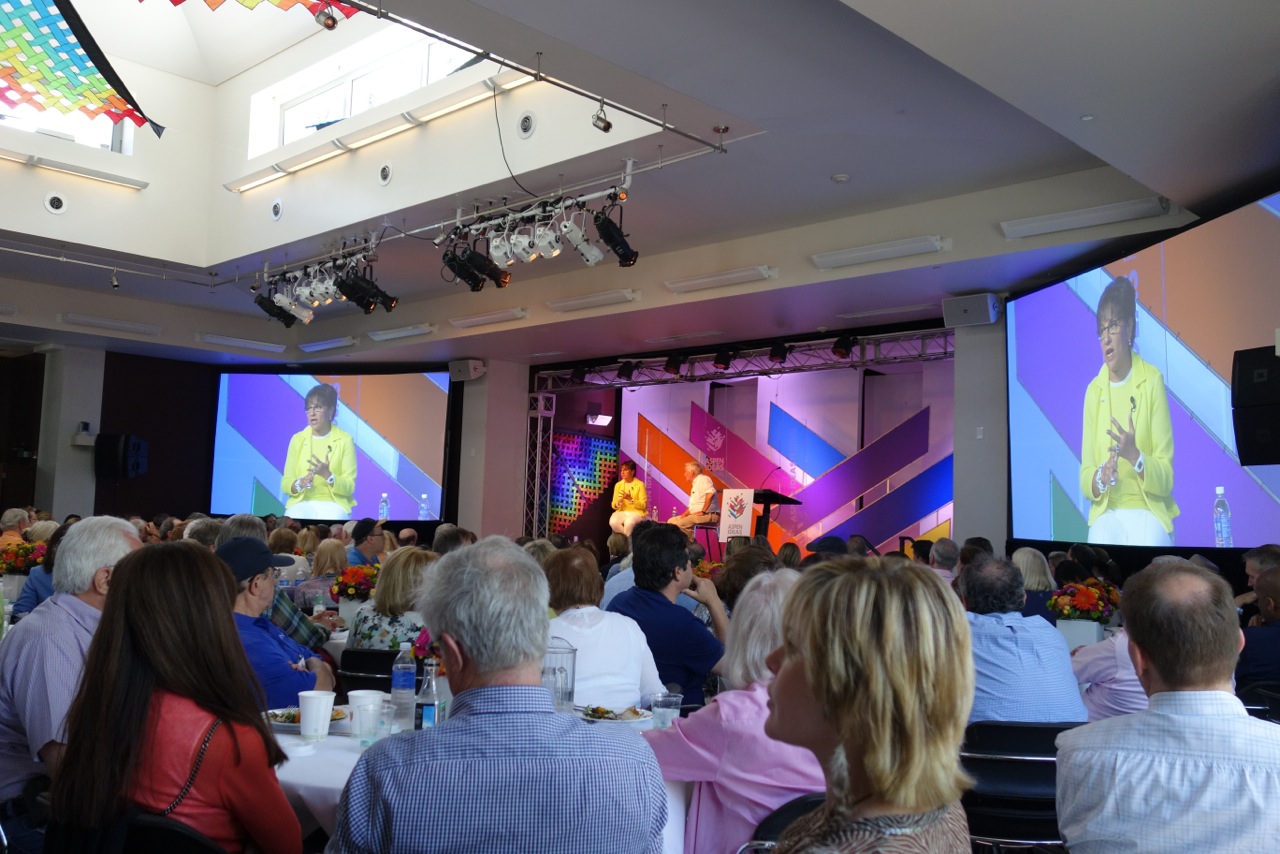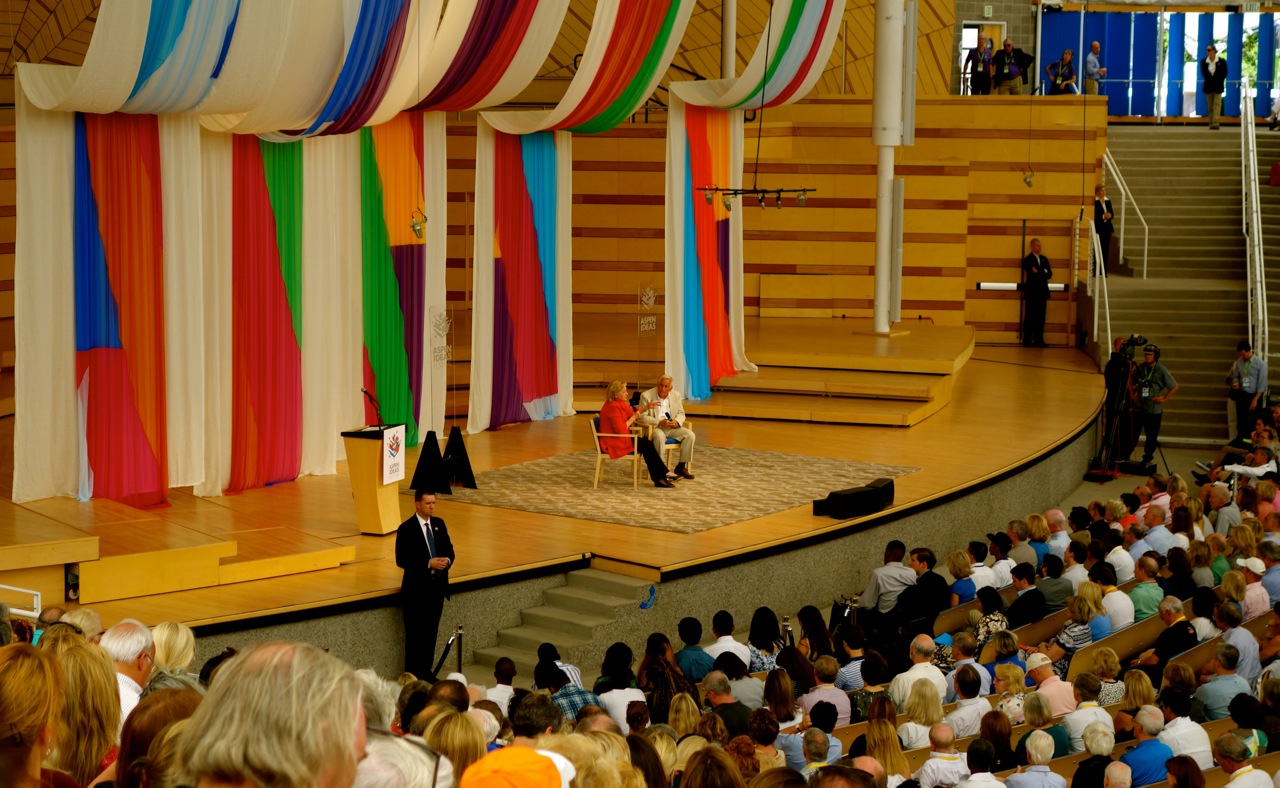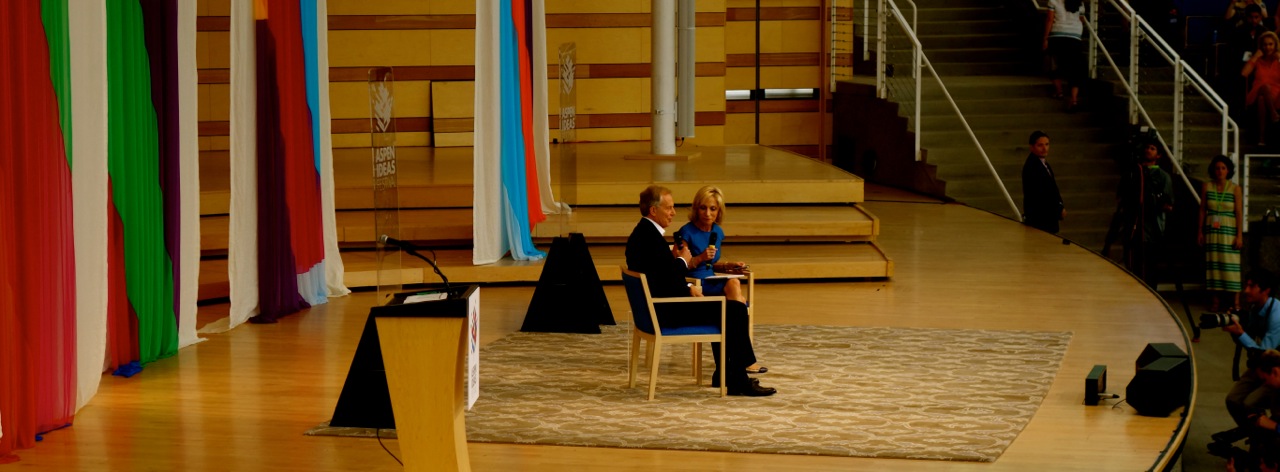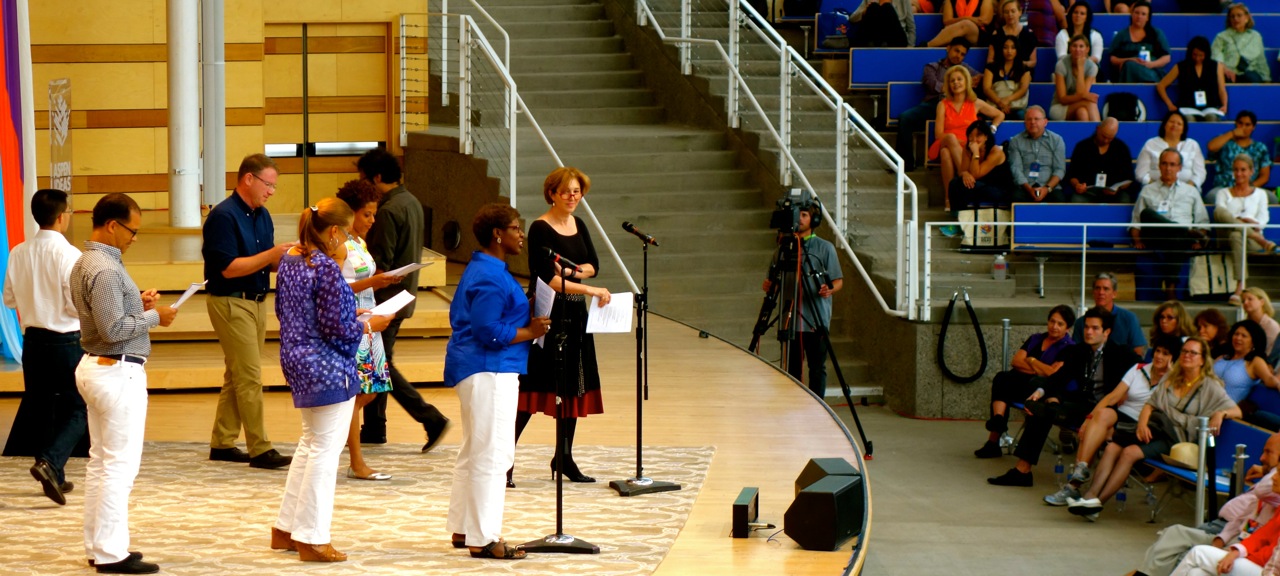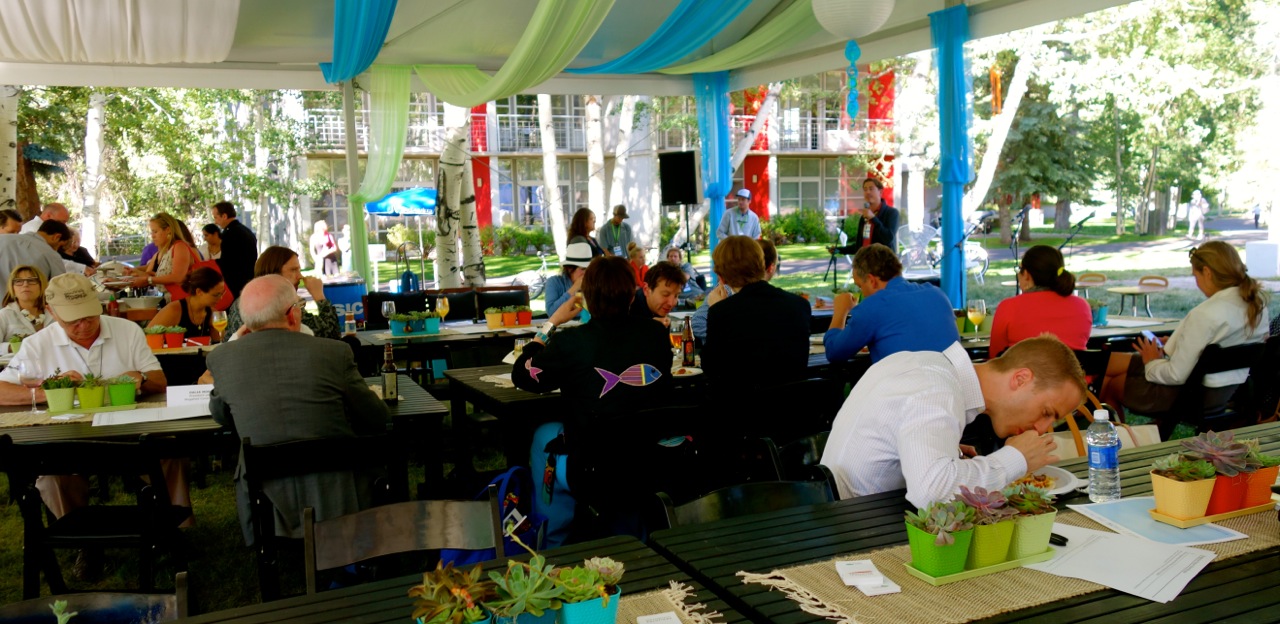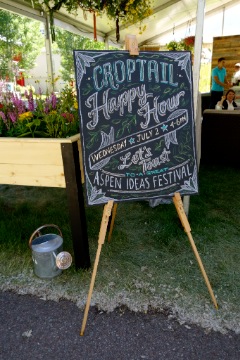The 10th anniversary Aspen Ideas Festival, produced by the Aspen Institute in collaboration with The Atlantic magazine, continues to trumpet optimism over the future, as the event has from its inception a decade ago. Yet this year’s theme of “Imagine 2014” – looking a decade ahead rather than at the decade past – felt tempered also over concerns about the limitations of progress yet to be won, ranging from the perception of Congressional gridlock and Supreme Court setbacks to deficiencies of funding and civil liberties quandaries resulting from medical and scientific advances, to name a few.
A theme running across many of the talks and conversations engaging luminaries in the audience as well as on stage was how to address issues of scarce resources in the face of vulnerable infrastructures, underperforming education institutions, opportunities to conduct hugely promising research and the challenges of war, human suffering and environmental degradation.
But before proceeding, let me describe the IdeasFestival a bit more. Begun in 2004, the event seeks to bring together hundreds of leaders in fields of business, government and scientific endeavor, as well as social entrepreneurs, into a weeklong series of talks and conversations.
The festive conference is held annually in Bauhaus-inspired structures on the campus of by the Aspen Institute surrounding this bucolic alpine meadow, festooned with bright banners and signs celebrating quotes of past presenters and thought leaders.
Photo: The Aspen Meadows.
The program is constructed every year as a complex web of plenary sessions, tutorials and “office hour” meetings with leading experts and provocative thinkers. As in the past, the conference is divided into two three and a half-day sessions, covering a total of 16 themes.
This year the themes were Global Dynamics, Work, Arts, Confronting Climate Change, Viewpoints, The Aspen Lectures, Humans and Machines, Cultural Identity, Age of Creativity, The Metropolis, Civil Liberties, Telling Our Stories, The Promise of Biotech, The University, Your Turn, and “What to Say”.
Photo: U.S. Commerce Secretary Penny Pritzker, interviewed by Walter Isaacson, President and CEO of Aspen Institute
Because all these tracks run simultaneously, the program feels more like a smorgåsboard or cornucopia, except that like searching for courses in college, you have to chose among them, perhaps racing between a couple of simultaneous events to try to capture tidbits from each. Word of mouth is also highly prized, as other attendees often compare notes of the highlights of each session, which are also covered in significant detail on the Aspen Institute’s blog and by The Atlantic’s extremely capable journalists, who produce special reports and also a daily “Five things you missed” as if there could only be five out of the scores of talks, interviews, panel discussions, tutorials, book signings and sidebars in the meadows and along the hallways on campus.
So from the early light of day, when the institute offers Yoga and Breakfast Panels, to well after midnight, you’re bound to find the likes of Arianna Huffington of HuffPost and New York Times’ David Brooks and Thomas Friedman or former congresswoman Jane Harmon dashing between program events, with the rest of us zipping along on bikes or scooters when necessary. Aspen’s premier event is distinguished from other grand conferences like World Economic Forum at Davos or TED in its new venue in Vancouver by not only being set within sight of natural splendor, but actually within it.
And as Ideas Fest is deliberately designed to to be held around the July 4 Independence Day holiday, it is both particularly festive and somewhat zany and informal – you might see a former head of state or Hollywood writer (Aaron Sorkin was one of the interviewees and presenters this year) chowing down on a “Lets Be Frank” organic hot dog at one of the the Bay Area company’s “dogs gone good” rolling carts, brought to Aspen for the occasion in recent years. In fact, this correspondent admits sorrow I did not get a photography for this site of Robert De Nero, who was in town to screen and disuse a film about his painter father, sprawled among other attendees on the lawn of the Music Tent for a nap. Quite a few attendees who spotted him were ‘atwitter’ over the sight.
To provide a quick romp through the program, please note that during this 10th edition, and long overdue many of us would say, the most prominent positions on stage were assigned to women leaders. In fact the top three leaders interviewed at the “Afternoon of Conversation” at the Benedict Music Tent to which all attendees were invited were women – Harvard President Drew Gilpin Faust, former Secretary of State Hillary Rodham Clinton and Pepsi CEO Indra Nooyi. They were followed by interviews of former VP and climate change activist Al Gore, former UK Prime Minister Tony Blair, and David Petraeus, former head of the Central Intelligence Agency.
And, right from the top, Hillary Clinton stepped up with a strong argument in favor of addressing the income and wealth gap to restore the American Dream, while also describing her unwillingness in the 2008 campaign to call her vote authorizing the Iraq war flawed, saying she was reluctant to do that when men were serving still in combat there. “Obviously it was a mistake,” she now says.
Clinton spoke in favor of a year of national service -saying she and Bill Clinton had sought to instill a love of volunteerism in daughter Chelsea, and she also endorsed automatic registration for 18 year olds to vote. The former U.S. senator from New York state said the age span on non-educated women in the United States is decreasing for the first time in history… Regarding 2016, Clinton said whoever runs for president must be able to put forward a clear vision for the country — leading one to expect she will be providing one in good time. She also stated anyone who campaigns to go to Washington saying they will not compromise should be automatically disqualified.
Once again, much of Clinton’s talk had to do with the limitations of U.S. power in foreign policy, or even limitations on voting rights. She also faulted the Supreme Court “Hobby Lobby” decision earlier in the day, calling the decision to ascribe religious rights to a corporate entity a ‘slippery slope’ when it comes to limiting personal rights, such as a woman’s to birth control.
On foreign policy, Clinton advocated for engagement even amid uncertainty. “We have such an historic responsibility because of who we are, and what we have become,” Clinton said of the United States. “The world matters to us here in America…because there is no escape in an interdependent world.”
Preceding Clinton was Harvard’s Drew Faust, who showed some moxie as she parried with interviewer David Rubenstein, cofounder and co-head of Carlyle private equity group. When Rubenstein suggested John Harvard got a pretty good deal naming the university, after donating his library of a few hundred books, Faust retorted “make me an offer.” She said 65% of Harvard students receive financial aid. For parents wanting to raise their offspring to become a Harvard Man or Woman, Faust urged them to “Make your child interesting!”
Harvard’s first woman president also expressed no reservations on how long she’d like to serve – saying she could imagine serving as long as Charles William Eliot, whose term ran for 40 years, from 1869-1909, indicating she would have 33 years more to go.
Photo: Former UK Prime Minister Tony Blair, interviewed by Andrea Mitchell. “The only society that works in the modern world is a society in which we are tolerant of diversity,” Blair stated.
Third came Indra Nooya, CEO of PepsiCo, who told interviewer David Bradley, owner of The Atlantic, that she does not believe women – or men – can “have it all”. Nooya recounted a very personal story about when she had been told she would become president and elected to the board of PepsiCo, yet when she arrived home that night around 10 PM she still was sent by her Mother out to get milk for the family. “I went out and got the milk,” she said.
Nonetheless, Nooya has lead one of the biggest transformations in the history of Pepsico, focussing on healthy foods with greater nutritional value and more environmentally sustainable products and packaging while providing a more motivated workforce. Sometimes this has her in trouble with change averse investors, and sometime at home, where she is at the bottom of the list in the family pecking order. “They say you should be glad to [still] be on the list!,” she adds.
But presenters are not only in the big tent, nor leaders in academe, politics and corporations. Many of the 250 presenters are thought leaders in more narrow areas. And the environment is sufficiently relaxed that the Atlantic’s Bradley led off the conference by joking the presenters had been encouraged to relax in preparation for their talks by indulging in Colorado’s newly legalized supply of marijana. And to that point, Colorado Gov. John Hickenlooper was interviewed by Katie Couric over how the law was functioning, six months into it. An operator of a store selling pot in Aspen said demand was strong, yet noted the governor is in an usual position trying to make work a law which he had personally opposed.
Photo: “No-one is born a racist” Race Card Project of NPR host Michele Norris, who read scores of six word submissions on race and identity on stage along with Gwen Ifyll and others.
Issues of humanitarian rights, climate change, sustainability, global security, education, urban designs and financial limitations to funding crumbling infrastructure much less the rest were frequently discussed throughout the six day extravaganza.
Many were troubling, such as examining the consequences of the tortured deaths of three boys in Israel. Perhaps none is less understood or more pervasive than the issue of massive human trafficking in this world, often in affluent communities right under the noses of the wealthy, were for example young women are harbored and forced into servitude or to perform as sex slaves. Monique Villa, the CEO of the Thomson Reuters Foundation (the charity branch of my work alma mata), estimates there are 30 million humans living as slaves today – more than at any other point in history. Speaking on a Lunchtime panel on “Cleaning up the Supply Chain: Human Traficking and Slavery,” Villa noted allegations that enslaved people could be involved in work performed through government contracts. President Obama in 2012 issued an executive order to protect against trafficking, but the panelists argue this needs vigilance to ensure enforcement. Martina Vandenberg, founder and president of the Human Trafficking Pro Bono Legal Center suggest the need for a web tool kid for trafficking similar to what Transparency International did for corruption.
Often at Aspen Ideas Fest, one takes ones chances only to find oneself missing a great performance or presentation. This was the case on Thursday when former Treasury Secretary Timothy Geithner sat down for an interview at Greenwald Tent (a venue where all activities are to be recorded and archived for web review, but this one has not popped up at the time of this writing). I missed most of it, yet thanks to a fellow attendee, Deidre Byrne, I had a quick summary when I entered the tent late in the interview.
Geithner, as it turns out, made a strong case that Obama acted to avert another Great Depression and that the money returned to the Federal Treasury as a consequence of the spending now exceeded $100 Billion. He did blame Congress for curbing the spending, which he called “Premature austerity”, saying the economy would have bounced back even swifter had the government offered more liquidity. Across the Campus later that day, U.S. Commerce Secretary Penny Pritzker, also my college classmate, said countries around the world are showing eagerness to invest in the United states, rattling off as reasons our commitment to rule of law, intellectual property protection, spending on R&D, quality of university education and low-cost energy.
Photo: Attendees work on a dinner assignment at “IDEO Design Salon, Designing the Future New Rituals,” led by Yoni Bloch, Ashlea Powell, and Jonathan Harris.
For those interested more in personal felicity, American Enterprise Institute president Arthur Brooks gave a thoughtful explication on what leads to human happiness. First he notes that while we often think environmental factors lead to happiness, that 48 percent of a person’s happiness is simply genetic, while 40 percent is circumstantial, leaving only 12 percent of our happiness to factors that are within our control. Brooks identifies these as four – spiritual enlightenment, family, friendships and work. The first two of these, he considers self explanatory. Men around age 60 are often found to be the unhappiest demographic, however, he says because they have forgotten how to make and nurture friendships. Work, he adds, is about creating value for oneself and the lives of others, not so much for compensation. Brooks cited his favorite composer, a man who fathered 20 children and died relatively unknown, as exhibiting such a mission when the composer, Johann Sebastian Bach, said “I write music for the glory of God and the good of Man.”
Among one of the more fun features, is an interview Katie Couric did during the festival with Robert De Nero, and a frolicking lunchtime panel on Love and Life in General that she did with David Brooks.
Photo: Monsanto offered “Croptails” juices and green popsicles under a tent at Aspen Meadows.
On the environmental front, one of the sponsors, Monsanto, put forward its President and COO Brett Begemann to speak to the issue of sustainability. Monsanto has, of course, become infamous for its development of genetially modified foods (GMOs) However, Begemann stopped short of accepting any sort of labeling that was not voluntary, saying he feared there would be “a stigma that goes with that label,” that would give a negative connotation even when there might be no discernible difference between that fine and organic food. “It’s very hard to be sympathetic with your side when you take that position on labeling,” Hillis said.
Inventor Danny Hillis questioned Begemann on this, making the clear point it seemed a company by not accepting some broad labeling standards was acting as if it had something to hide. Or, as many marketeers might put it, in today’s social media world, if you aren’t defining your product and its benefits and purity, someone else will!
There are, of course, many many other talks, panels, and lectures available online.
Long time sponsor and co-producer, The Atlantic Magazine, has listed a video library of the available sessions.
For a somewhat random tour of two parts of the Aspen Meadows campus, and a snippet of prominent lawyer Ted Olsen speaking about the legal case regarding California’s Proposition 8 on Gay Marriage, view the tour of at Aspen Meadows campus.
For Snapshots of the Aspen Ideas Fest 1, which preceded my arrival, see The Atlantic coverage.

Sam Perry has been a correspondent and editor for Reuters and United Press International, covering business, technology and politics in North America and Europe. From journalist, he moved into investments and management as a venture investor and executive and has been involved in startup high tech companies in Silicon Valley for more than a decade, including Yahoo! and Tesla Motors.
He is President of Ascendance Ventures, which participates in seed stage fundings and was a former corporate venture capitalist for Reuters Greenhouse | RVC.
Sam is active in several nonprofit groups, including E2 – Environmental Entrepreneurs, business leaders supporting progressive environmental policies. Sam is also an alumni member of the Full Circle Fund, an organization of New Economy leaders innovating in a venture philanthropy model to provide expertise and grants to enterprises in the San Francisco Bay Area. As a VISTA volunteer, he worked as a community organizer in the coal country of Mingo County, West Virginia.



